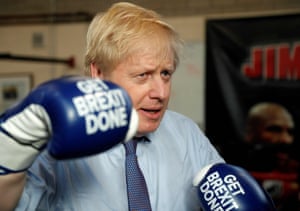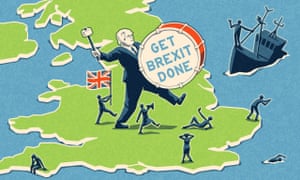One test of a campaign slogan is how efficiently it helps voters explain their preference to others and to themselves. Why Donald Trump? To make America great again. Why leave the EU? To take back control. Simple. Boris Johnson has found that kind of groove with his pledge to “Get Brexit done”, which is why he beat the phrase like a drum in televised leader debates this week. It packs a lot into four syllables: release from the EU for those who really care, and relief from having to think about it to those who don’t. It has the pleasing crispness of a page being turned, while making Labour’s policy feel like a threat to reread a grim chapter all over again.
As politics, “Get Brexit done” is snappy; as policy, it is empty. It is the vacuous sequel to “Take back control”, starring the same falsehood about Britain’s global stature. Johnson’s claim now, as in the referendum campaign, is that leaving Europe is an act of empowerment. It contains the illusion that we, the liberated nation, tell them, the spurned continentals, how things will be. Three years of negotiation tell a different story. The UK tried to retain privileges of EU membership without abiding by the rules, failed, and watched its deal deteriorate as a result. If the Tories win a majority, that pattern repeats all next year. The old movie will be remade with the same gallop towards a cliff edge, cheered on by hardliners lying about “clean breaks”.
Johnson’s plan is to complete a comprehensive free-trade agreement before transitional arrangements expire next December. More time is available, but he insists it will not be necessary. Under the terms of the withdrawal agreement, extension would have to be sought by July. The government would need to make record-breaking progress in final-status talks in the first months of 2020 for Johnson’s boast to be vindicated. That looks unlikely. Trade talks between advanced economies can fill the best part of a decade.
Ministers have three lines of defence for their improbable timetable. First, the UK and EU start from what Johnson describes as “perfect alignment and harmony”, so there isn’t much to adjust. Second, Phil Hogan, the EU trade commissioner, has said a year is sufficient. Third, people said Johnson couldn’t ditch the backstop from Theresa May’s deal, but he did; he is the naysayers’ nemesis.
Those arguments are bogus. Citing the status quo as evidence that change will be easy is an old Brexiteer con. As Sam Lowe, a trade expert at the Centre for European Reform, says: “Where we start isn’t what matters, it’s all about where we want to end up.” Johnson’s plan explicitly mandates divergence from EU norms. Its purpose is to carve out competitive advantage through deregulation. Brussels sees that as a threat to undercut continental businesses and dump substandard goods on EU consumers. The price of market access is set at a high level of compliance with European rules, which Tories despise. The narrowness of the Channel and the Eurosceptic fixation on de-alignment combine to make future trade talks harder than EU dealings with more remote countries.
When EU officials nod along with the tight timetable, they are being polite and trying not to spook British voters. The commission wants the deal ratified as much as Johnson does. An imbalance of power favours Brussels as much in the next phase as it did in withdrawal talks. A new hand is dealt but the rules don’t change: the lone state gets weaker cards than the bloc of 27. The commission brings cold-blooded negotiators, hardened over decades of top-level technical negotiation. The UK brings a demoralised civil service with little experience of trade talks, instructed by delusional Tories who think free trade is something to do with Britannia and ruling waves.
As for Johnson’s powers of persuasion, they are fictional. He achieved removal of the backstop by abandoning a promise not to permit a trade border between Northern Ireland and mainland Britain, burning the DUP and reverting to a Brexit model he had once vigorously rejected.

That climbdown hints at one method for meeting the December 2020 deadline. If Johnson is prepared to sign pretty much anything to show he has met his promise of progress, he can cobble a deal together – a “bare bones” agreement, according to Sabine Weyand, head of the EU’s trade directorate. That would still need subsequent negotiation and phased implementation, but there is probably a way to stretch transition at the 11th hour, calling it something else to allow Johnson the pretence of not having begged for an extension.
First overboard in the great betrayal will be fishermen. Brexit offered them false hope that foreign trawlers would be banished from UK waters. But hated quotas will be back. Other maritime EU states will demand them as a condition of progress in talks over other issues. Johnson will fold, and then systematically let down other voters who trusted him.
If returned to Downing Street, he will spend next year climbing the steep learning curve towards realisation that Britain thrives on frictionless access to the single market – something his deal prevents. He will discover the finer points of “rules of origin” that make it uneconomic for manufacturers to keep links in their supply chains outside the EU. He will notice businesses using transition to activate relocation plans they had drafted for emergency evacuation in case of a no-deal Brexit. His diplomacy will be sabotaged by Tory hardliners paranoid about gravitation back into Brussels’ orbit. Impatience for a trade deal with Washington will spur Eurosceptic zealots into battle against any pragmatist who tries to repair relations with Europe. Johnson will lie like crazy to appease both sides, and be despised for the duplicity.
That doesn’t mean Brexit will still dominate headlines. If the Tories prevail on polling day they will have a mandate to change the subject, and a vanquished opposition will not foist Brussels business back into the news. Jeremy Corbyn is already trying to foist it out of the election campaign. Neither of the main candidates to be prime minister sees benefit for themselves in a realistic debate about Britain’s European future. Why should they? Realism is a gloomy song, a meandering number with dissonant harmonies and no prospect of satisfying resolution. It is not a hummable tune. It lacks the upbeat tempo of “Get Brexit done”, which has the makings of a one-hit wonder to top the electoral charts by Christmas. But then the months go by, it is December 2020, Johnson’s jaunty tune is an awkward memory. And Brexit is still not done.

